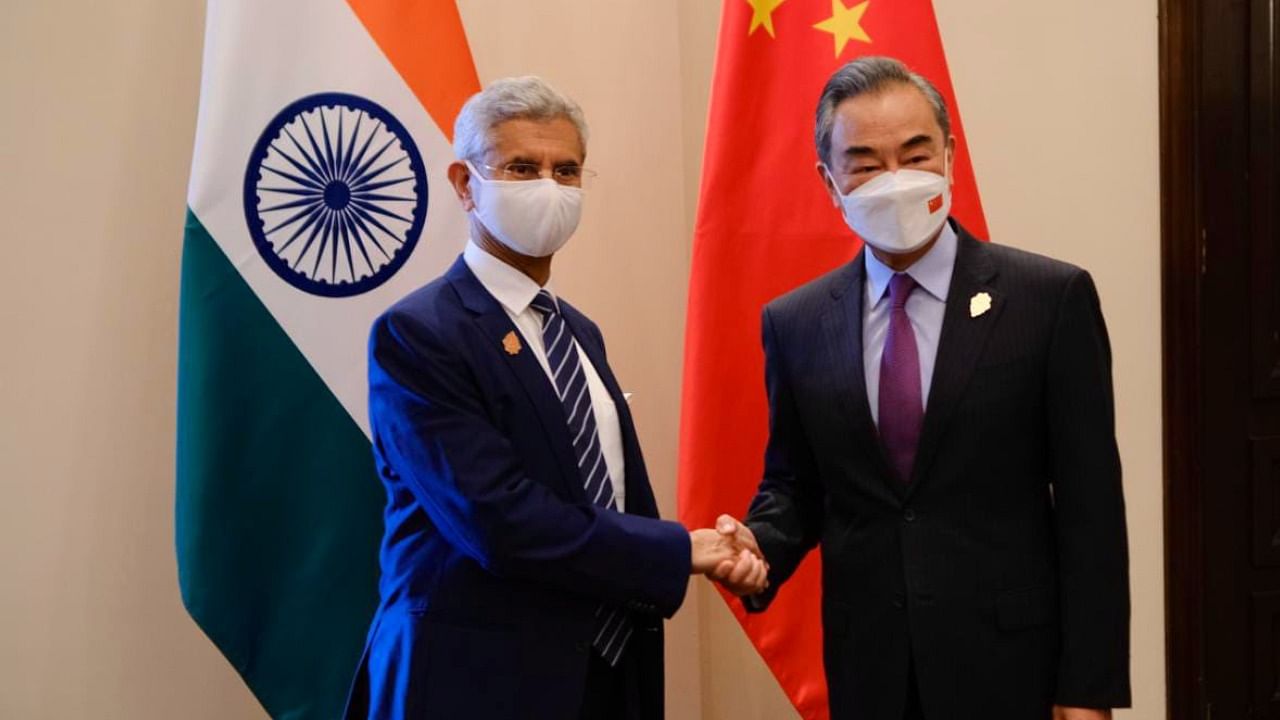
India on Thursday called for an early resolution of its more-than-two-year-long stand-off along its Line of Actual Control (LAC) with China in eastern Ladakh.
External Affairs Minister S Jaishankar had a bilateral meeting with Chinese Foreign Minister Wang Yi on the sideline of a G20 conclave at Bali in Indonesia. He stressed on completing mutual withdrawal of troops from all the remaining face-off points along the India-China LAC in eastern Ladakh, according to a press release issued by the Ministry of External Affairs (MEA). Beijing, however, issued a separate release, which had no word on disengagement of troops deployed by both sides along the disputed India-China LAC in eastern Ladakh.
The meeting with Wang was Jaishankar’s first engagement in Bali on Thursday. “Focused on specific outstanding issues in our bilateral relationship pertaining to the border situation. Also spoke about other matters, including students and flights,” the External Affairs Minister tweeted after his meeting with the Chinese Foreign Minister. “Shared perspectives on the international situation and its impact on the G20 deliberations.”
The release issued by the Ministry of Foreign Affairs of the Chinese government, however, quoted Jaishankar telling Wang that since the meeting between the two in New Delhi in March this year, the two sides had made positive progress in maintaining border stability, promoting practical cooperation and facilitating personnel exchanges.
Jaishankar and Wang are in Bali to attend a conclave of the Foreign Ministers of the G20 nations. The conclave is being hosted by Indonesian Foreign Minister Retno Marsudi.
During his meeting with the Chinese Foreign Minister, the External Affairs Minister recalled that disengagement had been achieved in some friction areas along the LAC. He reiterated the need to sustain the momentum to complete disengagement from all the remaining areas to restore peace and tranquillity in the border areas.
He also reaffirmed the importance of fully abiding by bilateral agreements and protocols and the understandings reached between the two ministers during their previous conversations, according to the press-release issued by the MEA.
The two ministers agreed that the military and diplomatic officials of the two sides should continue maintaining regular contact. They looked forward to the next round of meeting between the senior military commanders of the two neighbouring nations at an early date.
Jaishankar told Wang that India-China relationship could be “best served by observing the three mutuals – mutual respect, mutual sensitivity and mutual interests”.
The stand-off started in April-May 2020 with China amassing a large number of troops along its LAC with India, flouting the key 1993 and 1996 bilateral agreements for maintaining peace and tranquillity in the border areas pending the resolution of the boundary dispute through dialogue. The India Army’s counter-deployment to resist aggressive moves by the Chinese People’s Liberation Army’s soldiers led to the stand-off. It reached a flashpoint on June 15, 2020, when the Indian Army lost 20 of its soldiers in a violent face-off with the Chinese PLA in Galwan Valley. The PLA much later admitted that it had also lost four of its soldiers in the clash.
The negotiations between the two sides had resulted in mutual withdrawal of troops by both sides from some of the face-off points along the LAC – from the Galwan Valley in June 2020, from both banks of Pangong Tso in February 2021 and from Gogra Post in August 2021. The 15th round of negotiations between the military commanders of the two nations on March 11, however, failed to yield the much-expected deal for mutual withdrawal of troops from Hot Springs or Patrol Point 15 in eastern Ladakh. The diplomats of the two nations had a video conference on May 31 last, but could not make much headway, except agreeing to hold the 16th round of negotiations between the military commanders at an early date.
The impasse, however, still continues and the Indian Army and the Chinese PLA commanders are yet to hold the 16th round of negotiations.
Jaishankar on Thursday recalled his meeting with Wang in Delhi in March 2022 and reviewed with the Chinese Foreign Minister progress on some key issues discussed then, including the return of the students, who had come back to India from China after the Covid-19 pandemic started in early 2020 and led to shutdown of academic institutions. He stressed the need for expediting the process of return of students from India to China to continue studies.
The two Ministers also exchanged perspectives on other regional and global developments. Wang appreciated India’s support during China’s stint at the chair of the BRICS this year and assured China’s support for India’s upcoming G20 and the Shanghai Cooperation Organization presidency, according to the release issued by the MEA.
